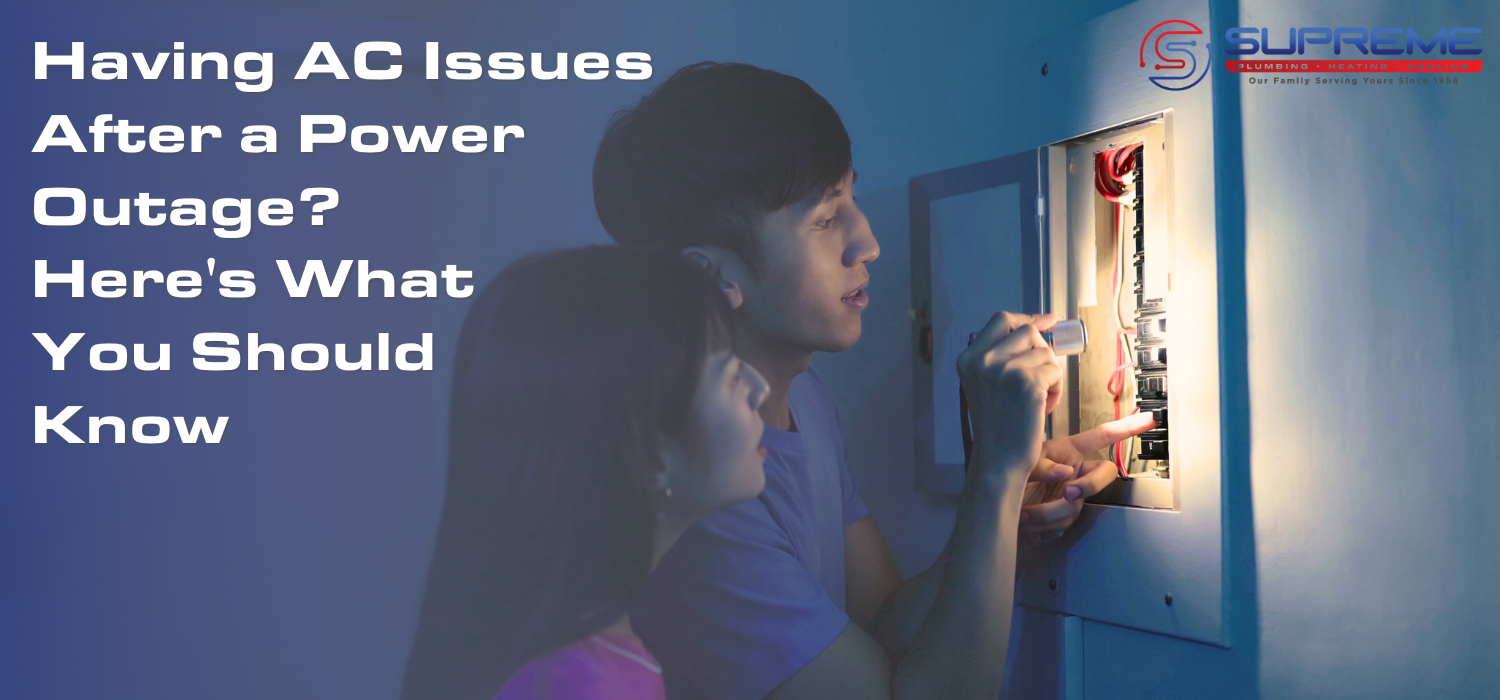Power outages can be a major inconvenience for any homeowner. After having to potentially throw out perishable food, not having cable or internet, and walking around in the dark—the last thing you want to deal with is your AC unit not working after a power outage.
A lot of the time, the effects of a power outage to your unit are nothing to be too concerned about. However, if you notice issues with your system that are worrisome, it’s important that you get them taken care of before they get worse.
Below, we highlight types of outages and the effects they can have on your AC system, as well as some potential solutions and prevention routes!
Power Outage vs. Power Surge
There are two types of power disruptions that can affect your AC—a power outage and a power surge.
A power outage can be caused by weather, equipment failures, fallen trees, among other causes.
On the other hand, power surges occur when electricity flow is interrupted, then starts back up again, or when something sends electricity flowing back through the system. This can be caused due to hazards like lightning, or something smaller, like a hair dryer.
The main difference is that a power surge can cause appliances to shut off briefly. However, an outage may cause appliances and electronics to shut off for a longer amount of time.
Both of these issues can cause damage to your AC. However, a surge is typically more problematic, as most damage occurs as the power surges back on.
Potential AC Issues Following a Power Outage or Surge
There are a couple issues that can arise after a power disruption. These issues include, but are not limited to, the following list:
Complete Shutdown
During a power outage, your AC will shut down. This means that the cooling mechanisms stop, and the fan and other major components of the system will quit functioning. Without power, the AC cannot provide any flow of cool air.
Solution: After the power comes back on, your AC system should reboot and start back up. However, if it doesn’t come back on (and you can’t power it manually), it’s probably a good idea to call an AC expert for help.
Compressor Damage
Power outages may cause voltage fluctuations once the power is restored. This can cause wear and tear to the compressor, which is a critical part of your AC.
Solution: If you notice that the compressor is malfunctioning, try restarting the whole system by turning off the breaker and turning it back on. If you notice that the compressor is failing altogether, call an expert to come look at it.
Tripped Circuit Breaker
When the power is restored after an outage, the wave of electricity may cause the circuit breaker connected to your AC to “trip.” This is just a safety mechanism to prevent the electrical system from overloading.
Solution: This is nothing to worry about, and can typically be solved by just flipping the breaker.
Humidity/Increase in Temperature
When the power goes out, and takes your AC down with it, the temperature in your house may be uncomfortable. If you find yourself without an AC for a while, note that there are ways to regulate temperature.
Solution: To stay cool, try things like keeping windows closed and covered, shutting and insulating your doors, and avoiding turning on the oven.
Prevention Measures to Protect Your AC
If you’re worried about your AC not working after a power outage, there are a number of precautions to take that can offset some of these problems.
Surge Protection
A surge protector for your AC unit is a smart idea in the interest of preventing surge damage. There are versions that protect your whole HVAC system, as well as versions that just protect your air conditioner.
You’ll pay the cost upfront, but it will save you an arm and a leg once you consider the cost of repairing or replacing your system in the future!
Turn Your Unit Off if You’re Anticipating an Outage
Storms are a dangerous time for your AC. During severe weather, such as lightning or thunderstorms, your home is at risk of a power surge that could potentially destroy your system. Therefore, get ahead of the storm and turn off your system.
Flooding is also a danger to consider. If your power source gets submerged, your AC will suffer irreversible damage. If there’s any risk of flooding in your home, unplug your unit!
Stay Up-to-Date With Maintenance
It’s vital to find a trustworthy HVAC team (like us) to maintain your AC to decrease its vulnerability to power disruptions.
It’s a good idea to have an air conditioning expert inspect your system about twice a year to ensure everything is working properly.
After experiencing severe weather, it’s a good idea to schedule an extra check up just to be safe!
AC Not Working After a Power Outage? We’re Here to Help
At Supreme, we know a thing or two about storm damage and how it can affect your AC.
We have the ability and capacity to prevent issues before they start with quality maintenance,. We’re also committed to work tirelessly to find a solution to any problems after a power outage.
Contact us today for a free estimate!


